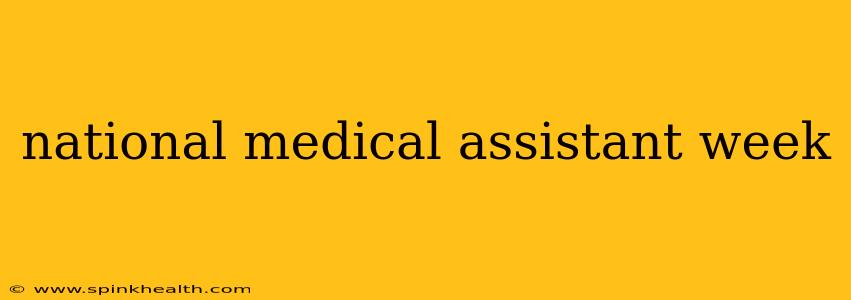National Medical Assistant Week, celebrated annually in the third week of October, is more than just a date on the calendar; it's a heartfelt tribute to the unsung heroes of the healthcare world. It's a time to acknowledge the invaluable contributions of medical assistants (MAs), those dedicated individuals who work tirelessly behind the scenes, providing crucial support and care to patients and physicians alike. Their roles are diverse, their impact profound, and their dedication unwavering. Let's delve into the heart of this important week and explore what makes medical assistants so essential.
What is the Significance of National Medical Assistant Week?
National Medical Assistant Week serves as a powerful reminder of the vital role MAs play in our healthcare system. It's a chance to express gratitude for their hard work, resilience, and commitment to patient well-being. Beyond the practical aspects, the week fosters a sense of community and professional pride among MAs, reinforcing their importance within the healthcare team. It's a time for recognition, appreciation, and celebration of their achievements.
What Do Medical Assistants Do? A Glimpse into Their Diverse Roles
The work of a medical assistant is far from mundane. They are the vital link between patients and physicians, performing a wide array of tasks that contribute directly to the efficiency and effectiveness of healthcare practices. Their responsibilities often include:
- Patient Care: Taking vital signs, assisting with examinations, preparing patients for procedures, and providing basic first aid.
- Clinical Tasks: Drawing blood, administering injections, performing electrocardiograms (ECGs), and sterilizing medical instruments.
- Administrative Duties: Scheduling appointments, managing patient records, handling insurance claims, and answering phones.
- Maintaining a Clean and Organized Environment: Ensuring the clinic is a hygienic and well-maintained space for patients and staff.
The specific duties of an MA can vary depending on their certification, experience, and the specific needs of their employer, but their overarching goal remains consistent: to improve patient care and support the medical team.
What are the Different Types of Medical Assistants?
While the core responsibilities are similar, there are nuances to the roles depending on the setting:
- Clinical Medical Assistants: These professionals focus heavily on the clinical aspects of the job, performing more hands-on medical tasks.
- Administrative Medical Assistants: These MAs are more focused on administrative duties, managing paperwork and patient information.
- General Medical Assistants: Many MAs combine both clinical and administrative tasks.
This spectrum of specialization within the role highlights the versatility and adaptability of MAs within the healthcare landscape.
How Can I Celebrate National Medical Assistant Week?
Celebrating National Medical Assistant Week isn't just about grand gestures; it's about showing sincere appreciation in meaningful ways. Whether you're a fellow healthcare professional, a patient, or a family member of an MA, here are some ways to show your gratitude:
- Express Your Thanks: A simple "thank you" can go a long way in acknowledging their hard work.
- Write a Note or Card: A handwritten note expressing your appreciation for their dedication is a personal and thoughtful way to show your gratitude.
- Organize a Team Celebration: Plan a small gathering or lunch for the MAs in your practice to show your appreciation.
- Nominate an Outstanding MA for Recognition: Highlight their exemplary contributions through an award or recognition program.
Small acts of kindness and appreciation can have a significant impact, boosting morale and reinforcing the value of their contributions.
How Long Does it Take to Become a Medical Assistant?
The path to becoming a certified medical assistant involves focused training and education. Programs typically range from six to twelve months, equipping students with the necessary clinical and administrative skills. Certification demonstrates competency and professionalism within the field.
What is the Difference Between a Medical Assistant and a Medical Secretary?
While both roles support healthcare teams, they differ significantly. Medical assistants perform clinical duties and assist physicians directly in patient care, while medical secretaries focus primarily on administrative tasks like scheduling and record-keeping.
What is the Job Outlook for Medical Assistants?
The demand for medical assistants is consistently high, and the job outlook remains positive. The increasing need for healthcare professionals creates ample opportunities for those pursuing this rewarding career path.
National Medical Assistant Week is not just a week of recognition—it's a testament to the dedication and invaluable contributions of medical assistants. Their role is crucial, their impact significant, and their work deserves our utmost gratitude. Let's use this week to honor these healthcare heroes and celebrate their remarkable contributions.

